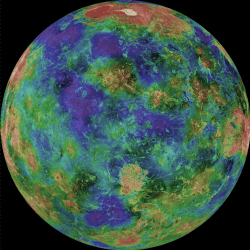Venus really sucks. It’s as hot as an oven with a dense, poisonous atmosphere. But how did it get that way?
Venus sucks. Seriously, it’s the worst. The global temperature is as hot as an oven, the atmospheric pressure is 90 times Earth, and it rains sulfuric acid. Every part of the surface of Venus would kill you dead in moments.
Let’s push Venus into the Sun and be done with that terrible place. Its proximity is lowering our real estate values and who knows what sort of interstellar monstrosities are going to set up shop there, and be constantly knocking on our door to borrow the mower, or a cup or sugar, or sneak into our yard at night and eat all our dolphins.
You might argue that Venus is worth saving because it’s located within the Solar System’s habitable zone, that special place where water could exist in a liquid state on the surface. But we’re pretty sure it doesn’t have any liquid water. Venus may have been better in the past, clearly it started hanging out with wrong crowd, taking a bad turn down a dark road leading it to its current state of disrepair.
Could Venus have been better in the past? And how did it go so wrong? In many ways, Venus is a twin of the Earth. It’s almost the same size and mass as the Earth, and it’s made up of roughly the same elements. And if you stood on the surface of Venus, in the brief moments before you evacuated your bowels and died horribly, you’d notice the gravity feels pretty similar.
In the ancient past, the Sun was dimmer and cooler than it is now. Cool enough that Venus was much more similar to Earth with rivers, lakes and oceans. NASA’s Pioneer spacecraft probed beneath the planet’s thick clouds and revealed that there was once liquid water on the surface of Venus. And with liquid water, there could have been life on the surface and in those oceans.
Here’s where Venus went wrong. It’s about a third closer to the Sun than Earth, and gets roughly double the solar radiation. The Sun has been slowly heating up over the millions and billions of years. At some point, the planet reached a tipping point, where the water on the surface of Venus completely evaporated into the atmosphere.

Water vapor is a powerful greenhouse gas, and this only increased the global temperature, creating a runaway greenhouse effect on Venus. The ultraviolet light from the Sun split apart the water vapor into oxygen and hydrogen. The hydrogen was light enough to escape the atmosphere of Venus into space, while the oxygen recombined with carbon to form the thick carbon dioxide atmosphere we see today. Without that hydrogen, Venus’ water is never coming back.
Are you worried about our changing climate doing that here? Don’t panic. The amount of carbon dioxide released into the atmosphere of Venus is incomprehensible. According to the IPCC, the folks studying global warming, human activities have no chance of unleashing runaway global warming. We’ll just have the regular old, really awful global warming. So, it’s okay to panic a bit, but do it in the productive way that results in your driving your car less.
The Sun is still slowly heating up. And in a billion years or so, temperatures here will get hot enough to boil the oceans away. And then, Earth and Venus will be twins again and then we can push them both into the Sun.
I know, I said the words “climate change”. Feel free to have an argument in the comments below, but play nice and bring science.


Purely for the sake of setting up a good argument, how do we rate the ‘alternative’ concept that the current state of our neighbour is less the result of hanging about in the hotter parts of town, and more the result of a being roughed up by the bad guys.
We may not know the guilty party – perhaps even Venus’ own moon – but what support for large scale impact resulting in a serious meltdown, the resulting major geo out-gassing giving the present atmosphere, partial melting reinforcing tidal locking to give the present almost locked rotation, and the impact even giving us a possible answer for the orbital and magnetic anomalies?
There are aspects of Venus’ errant behaviour that are not answered by the fashionable warming concept – which concept, in passing, would also imply that the ‘Habitable Zone’ is somewhat narrower and less habitable than generally accepted.
Either way, the debate is always good for generating some bar-room banter !
I loved to learn about Venus and why it is burning out!! Still people are exploring the chances for a survival in the Earth’s next!! Thanks for sharing!!
Universe Today unfortunately has a low quality standard of the “science” it reports. The views expressed are too often just politically convenient without any critical thinking.
It is most disputed that Venus has had a “greenhouse gas” effect! The opposite may be true, that Venus was created hotter and cooled down as the water vapour left its atmosphere. The myth of “runaway Venus” is just politically convenient as a scaremonger in order to motivate more concentration of money and power to the handful mafiosos who are the political elite. Dave Stevenson here talks about how much we don’t know about our twin planet Venus:
https://www.youtube.com/watch?v=ORUkiyoYy0E
Fraser Cain is doing a great job. But I wish he could find a little more time to read seriously about the subjects he talks about. Raising the standard a snippet for the new year, I would welcome.